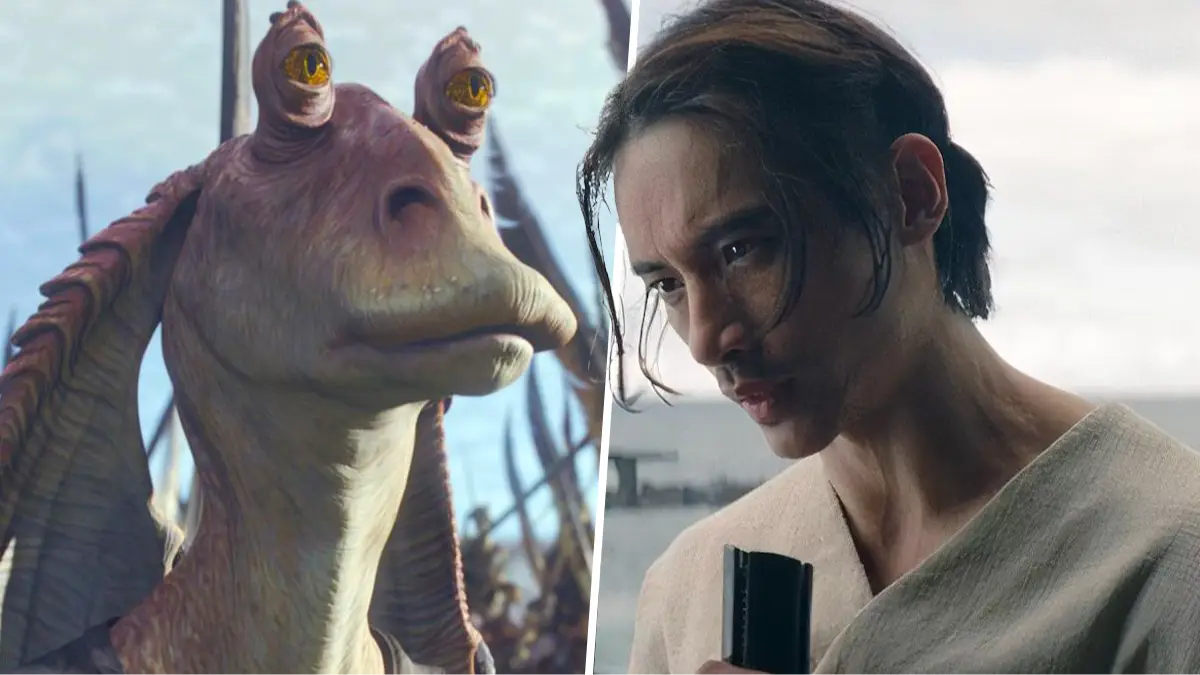
The lesson we’re quickly learning in Star Wars is that looks are incredibly deceiving. The Acolyte has done a fine job of sending us chasing shadows, as well as the wrong culprits, for past Jedi indiscretions. In doing this, though, Disney has integrated a popular fan theory, albeit uniquely.
For the first few episodes of the new Star Wars series, we were led to believe that the dark entity pulling Mae’s strings was out of sight and off-screen. Yet, as episode five so shockingly revealed, we were wrong. Although this Sith reveal left some fans further disgruntled with the show, I, for one, loved the transition from unsuspecting bumbling idiot to Darth Daddy.
Instantly, I thought of Jar Jar Binks. Not because he’s a Daddy – though some may think of him in that way – but because it so perfectly mirrored the fan theory that Jar Jar is actually a cunning Sith lord.
Whether you agree with the theory or not, the arguments in support of it are rather compelling, and once again line up with Qimir in various ways. Chiefly, in how his awkwardness deceives those around them into believing he's incapable of greatness. In Episode I, Jar Jar is called “pathetic”, and seen without intellect; although Qimir is by no means so dramatically dumbed down (he can mix poisons), he’s regarded as harmless. Even when in the presence of Jedi, he managed to remain unnoticed.
Advert
Have you watched The Acolyte yet? You're missing out if you haven't
You then have Qimir's use of clumsiness to test Mae and/or evade harm; the latter is less commonplace, but it does happen. Again, this mimics Jar Jar in his ability to achieve physical feats that only skilled Force users are capable of. For Qimir, deceptive movements make him seem weak and thus able to be overthrown or cast aside, a mistake Mae foolishly makes. And this happens even despite Qimir tracking down Kelnecca in a forest filled with various dangers.
The fact that Mae so willingly accepts him as capable of that, while also believing him incapable elsewhere, further mirrors Jar Jar in how the Gungan manoeuvres himself into a political position of power, however minor it may be.
Both characters angle themselves into significant events despite not appearing to have a direct connection. A prime example of this is how Qimir knows so much of Brendok and of Sol’s betrayal, and utilises it, yet he never reveals how he has this knowledge. It’s the same way Jar Jar becomes the deciding vote for giving Palpatine full control during an intergalactic emergency. Two figures without an obvious stake suddenly control how the dice fall.
But what of redemption? That’s another key component of the Darth Jar Jar theory: that he may be seeking to undo his past through helping the Jedi.
Qimir doesn’t appear to be interested in any kind of redemption, for he doesn’t believe himself a villain to begin with. Yet, both characters have a morally grey ambiguity about them, arguably Qimir more so. They’re not stereotypically good or bad characters but instead exist in the grey areas surrounding those concepts. Maybe the goal for both was never righting past wrongs but simply to restore balance to the world and, subsequently, the Force...?
You don’t have to believe Jar Jar was Sith, only to know the theory for you to see the similarities so blatantly played out on-screen. George Lucas has always likened Star Wars to poetry in that it rhymes; well, here we see that connection, those rhyming couplets between the old and new.
Topics: Star Wars, TV And Film, Disney
